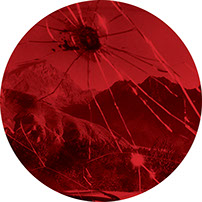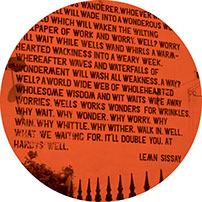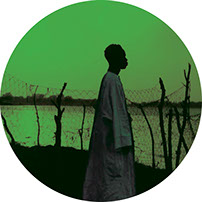N O T E S F R O M T H E S O U T H
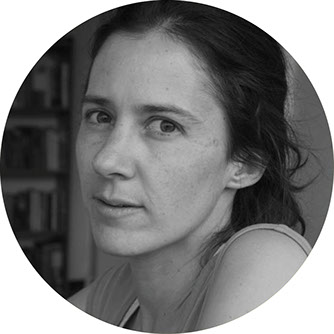 Return to Edén
Return to Edén
Edén is the delicately hewn debut from director Elise DuRant. The film tells the story of a young woman who returns to 1980s Mexico where she grew up, and where she revisits memories of her late father (played by Will Oldham) and his bohemian life of self-determination. Bathed in a dusty golden palette and fuelled by the fragility of human memory, the film is a gentle but powerful meditation on loss and belonging. I spoke to DuRant about this small but remarkable film.
Peter Machen: I’m interested in the extent to which you have fictionalised or reimagined your own childhood in Edén. I also found the film engaged a lot with the intersection between recall and reconstruction. When you watch the film now, how much of it is a new story? And how much of it is an accurate reflection of your past?
Elise Durant: My father had a romantic notion of Mexico, informed by westerns and travel writers of the time. In a certain way, he lived out his fantasies in Mexico as an adventurer. As his only daughter, raising me on his own, I fitted into his adventure and fantasies. He was very charismatic, and he introduced me to art and culture and experiences that few children around me were exposed to. And, yet, I’ve never quite known exactly where I fit in. My father was American in a way that, since I was a child, I was in awe of, and could not relate to: he moved in the world as if it was his. I never had that. Wherever I was, I was the foreigner. I came into this world feeling there was a set structure that I had to quickly learn and fit into, but always felt out of place, like I could never get it right, never truly be fluent. I also saw my father over the course of his lifetime become deeply disappointed and wounded by the world. It almost seemed, from my perspective, that he had created a world for us to live in that didn’t allow for him to truly be himself. I wanted to explore that in Edén. It’s a bit like the daughter fits into the father’s idea/fantasy/romantic vision, but what is her place in all of this when that vision has died? What is she left with? And I also wanted to explore a particular moment in this young woman’s life when she tries to understand her place in the world. I wanted to present that very masculine, sparse world I was raised in and help her find a new direct relationship with her motherland. Edén is fiction. It’s its own story, just as a writer may draw from personal experience to create a short story.
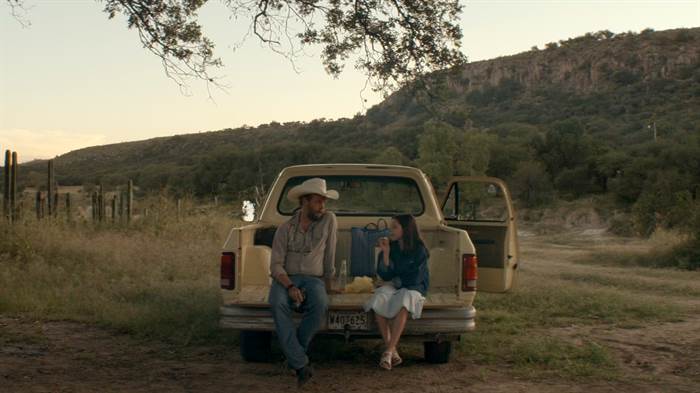
PM: The actress Diana Sedano who plays Alma is at least nominally an avatar of yourself, both physically and in her mode of being (although of course she is also very different to you). How does it feel to watch a proxy of yourself on screen? And can you tell me a little about the process of casting Alma?
ED: It’s funny, when casting Alma I looked to very practical things: she had to be bilingual and physically ambiguous in that she not be identifiably of any specific nationality. And yet she was the hardest to cast, the character that I knew the least about. I wanted her to embody this restraint and cut-off emotionality that Alma has inherited from her father and that has brought her to being isolated. I can imagine Diana wanted to desperately claw herself away out of those rooms we were filming in. I kept boxing Diana in, constraining her. That’s what Alma is.
PM: It’s rare nowadays to watch a film that is so free of references to other films and film history. Was this intentional or simply your natural, intuitive response to filmmaking?
ED: You could say I work more intuitively. I think we’re all informed by what comes before us. I’ve always been drawn to specific intimate moments in films. But it wouldn’t make sense to refer to other filmmakers when making decisions about Edén. The idea was to tell the scene in the cleanest, most straightforward way possible. It was important that the story be told from Alma’s perspective, and that we stay with her. I knew I wanted to shoot in widescreen format, with a washed out palette, as a nod to certain cultural references of my father’s generation, such as the western. I knew we had to go to John’s back to reflect his emotional distance from the world at key emotional moments, and then repeat that with Alma, to convey that she had inherited these traits from him. I knew that I wanted to give importance to the ambient sound, and to stay there with the characters with very static long shots, so that the place became a character with them. And I knew that I wanted to hire local non-professional actors, again so that place became more real. I don’t know if this may have something to do with it, but I didn’t study film in college. I studied still photography with Joel Sternfeld, as well as short story writing. I learned filmmaking from working in the editing room. Still photography, short story writing, editing: they are all about paring down – at least from the schools of thought I come from. Vicente Pouso, Edén’s director of photography, had a long career as a still photographer before coming to Edén, so we saw eye-to-eye on creating static, minimalist shots.
PM: With Edén, I found that a second viewing greatly enriched both the film and my understanding of it. Did you intentionally prefigure later moments in the film with earlier references – or was it subconscious? And do you think that this approach reflects real life, in which we tend to repeat themes and choices, regardless of our desire to do so?
ED: Yes, those who have seen Edén more than once have said similar things, that they see things they hadn’t caught on the first viewing. This makes me happy. There is a path of breadcrumbs that has been laid down in Edén that is there to guide you along the way, a key word here, an object there.
PM: Tell me about your choice of palettes? Are the muted browns and pinks and yellows intended to suggest nostalgia and memory, or are they accurate reflections of the colour of the light in Mexico?
ED: The idea was to shoot during the dry season, when the rains had passed. We accentuated that palette with the wardrobe and set design. Those colours are meant to reflect a certain austerity, a barrenness to Alma’s world. And, as I had mentioned earlier, they also nod to the western. I was asked if I wanted to make the past a certain colour palette and the present another, but did not want to do that. Instead I wanted the present and past to meld, to not have clear indicators of “okay, now we’re in the past”. I thought the viewer would figure it out at one point or another, and if one person figured it out later than another, that was fine by me.
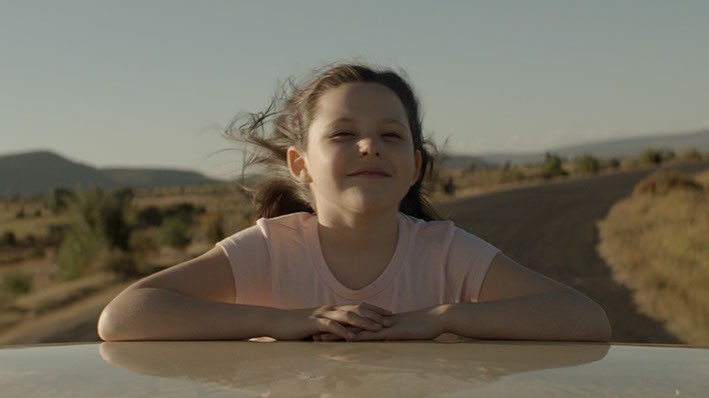
PM: Can we talk a little about the process of casting Will? When you were writing the film, did you have him in mind? Does he remind you of your father in any way? And did he have any input into the script or the filmmaking process?
ED: Will came to mind after the script was written, in the moment I began to think of a cast for Edén. He was the first person I thought of, the ideal person for the role. I knew he acted but I knew him more from his music. I was drawn to his voice and the words, how they were put together. It was so raw, and personal. He also had a reputation for being very guarded, very private, and this reminded me of my father. I wrote to a friend of mine who knows Will, and asked if he could help me contact him. He presented the idea to Will, and a few days later Will and I were talking on the phone. We spoke for close to an hour and talked about the role. I then sent him the script. We spoke again, and he was on board. We corresponded over the course of a year. I would share with him any and everything I could about Mexico, my upbringing, my father, certain ideas I had. We never spoke again about the script, and I didn’t want the actors to see themselves in dailies, so he didn’t see the film until just a few months ago for the first time.
PM: Did the dialogue change much during the filmmaking process?
ED: The dialogue stayed pretty much the same as it appears in the script. I love distilling things down to the bare minimum. So, we did keep paring the dialogue down to the bare bones in the editing process.
PM: I’ll admit that during both my viewings of the film, I kind of forgot about the opening scene in the abortion clinic, which – of course – has considerable relevance to the rest of the film. I watched the film with a woman friend of mine and her husband, and she spent most of the film thinking about the events in that context, while her husband and I did not. Do you think that one’s gender influences one’s response to the film – and to cinema (and other artforms) in general?
ED: It’s funny you say that, because those who have connected the abortion scene to Alma and Paco’s confrontation scene have been women; they get the connection between Alma and Paco that is there for me. But, I think that what people take from Edén depends more on the person – their sensibility and where they’re coming from – than on gender.
PM: Did you, in your own life, go back to Mexico to uncover the past and re-trace your father’s life?
ED: I returned to Mexico for the first time on my own in my mid-20s. I think I was secretly looking to reconnect with that mother figure I felt I had lost when we were forced to leave the country when I was a little girl. (Hence the abortion scene and not the father’s death triggering the return.) It was a deep, deep loss for me. When my father died, and I inherited his journals and photographs, and books, was when certain things about his life began to reveal themselves. He was a very private man that spoke about himself and his past on rare occasions. He was shrouded in mystery.
PM: And what do you think your father would have thought about the film?
ED: I really don’t know what he would have thought. He was so private.
PM: Was making the film a healing process for you? And do you think that it might be capable of having a healing effect on viewers?
ED: Yes, now that you ask, I can say that it has been a healing process to make Edén. I don’t think I could have said the same a year ago though. I’m in a different mental space now. I can let my father rest. I no longer identify myself as an orphan in the world. My life is now my own. A woman wrote me after she saw Edén to tell me how much the film had moved her. She said she cried for an hour the next morning, and thanked me for making it. It triggered something for her in her own life. Others have approached me after screenings to share how the film has touched them. So yes, I think it can have a healing effect. I think we all know the truth about our lives and where we come from. It’s the concealment of the lie that creates the damage. The healing process is in bringing it to the light.
PM: Edén is unusual (though not exceptionally so) in that there is no score involved, and all music and sounds are ambient. Was this your intention from the beginning? And do you think that it makes the film harder to watch for contemporary audiences? It seems to me that omnipresent scores only became mandatory in commercial cinema in the 1980s. Do you think that this has changed the ways in which viewers relate to cinema?
ED: I knew from the beginning that I did not want a score. Edén is so silent as it is, so sparse, I think, that it can be uncomfortable for some to watch. It’s interesting you bring up this word “mandatory”. It seems to me that films these days are measured against a “mandatory” checklist. You’d think that so many great filmmakers who have come before us – most of whose work would probably fail if measured up to that checklist – had not informed filmmaking. Cinema is one of the greatest arts of our time. And there needs to be a certain amount of freedom for exploration and playing with the elements available. It’s the films that don’t necessarily comply with convention that have stood out to me and enriched my life, that make it worthwhile, because you can see in them a search to try to understand our experience on this earth while we’re here. It’s the unique voice, the intimate moment, that brings me a sigh of relief, because they are trying to get at the intangible stuff, the hard-to-grasp stuff, the stuff that makes us human. I don’t care to see an idealised human being who says everything perfectly at the right time. I can run into that at a cocktail party. Cinema allows us the privilege to go into their bedroom afterwards, once they’ve shed their clothes, to quietly sit with them by the window on a Sunday afternoon.
PM: Finally, in an industry that remains dominated by men, do you feel in any way constrained by your gender? And how do you feel about operating in the industry as a “woman filmmaker”? And do you think that there’s any truth to the notion that women make films that are in some ways intrinsically different to those made by men?
ED: I was unaware of any differences until I went into production with Edén. I prefer to see it as each mind is a world of its own with different sensibilities, some speaking from how they’re identified in society based on their gender, some not. Having been born female will, if unconsciously, always inform my work. Since filming Edén, I have more respect for a woman’s effort to direct. It’s made me want to seek out filmmakers who are women and ask them about their experiences, their approach. I now see that making Edén, my first film, was a voice-building process. I have very clear ideas on how I want to work and make films in the future. For the next project, I will know how to identify and ask for what will support me as a filmmaker.
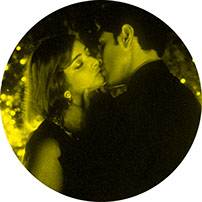
More
Film
© 2017 Peter Machen. All rights reserved About Contact Peter Machen Web design: The Communication Factory
